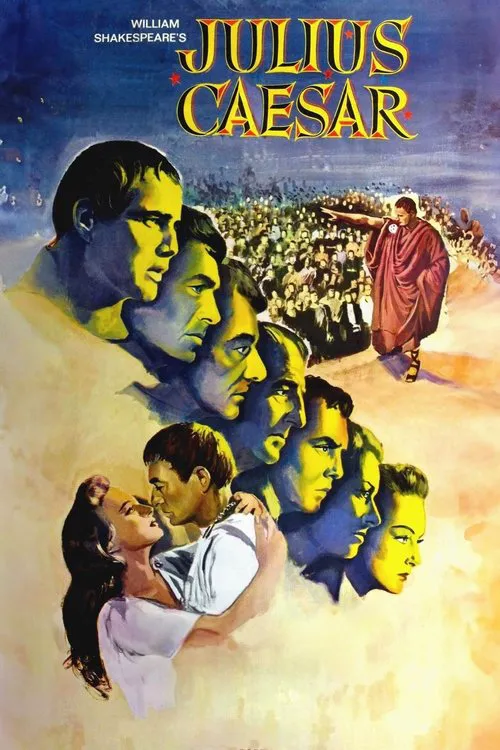Julius Caesar

Plot
In the epic drama "Julius Caesar," directed by Joseph L. Mankiewicz, the story revolves around the fateful events that ensue following the assassination of the illustrious Roman leader, Julius Caesar, by a group of conspirators, led by the disillusioned and idealistic senator Marcus Junius Brutus. The film begins with the triumphal return of Julius Caesar, the brilliant and charismatic Roman general, to Rome, after his impressive conquests abroad. His victories have garnered him immense popularity among the Roman citizens, and his power and influence have grown exponentially. However, this newfound power has not sat well with Brutus and other Roman senators, who fear that Caesar's growing authority will eventually lead to monarchy and the downfall of the Roman Republic. As the play unfolds, Brutus and Cassius, a close friend and fellow conspirator, engage in conversations that reveal their deep-seated worries and misgivings about Caesar's intentions. Despite their reservations, the conspirators manage to convince the other senators, such as Cimber and Metellus, to join them in their plan to eliminate Caesar. Meanwhile, a mysterious stranger, Decius Brutus, emerges as a catalyst in the events that transpire, using his persuasive abilities to manipulate the minds of Caesar and the conspirators. On the Ides of March, a pivotal day in Roman history, Caesar becomes increasingly wary of the growing resentment among his citizens, which eventually culminates in the notorious plot to assassinate him. Despite his better judgment, Caesar attends a session of the Roman Senate, where the conspirators ambush him with their daggers. In a chilling and dramatic scene, Brutus approaches Caesar, declaring "Et tu, Brute?" ('And you, Brutus?' or 'You, too, Brutus?'), a poignant expression of shock, betrayal, and anguish that captures the depth of the conspiracy. The aftermath of the assassination sends a shockwave through Rome, as Brutus and the conspirators, fearing retribution, flee in the direction of the Forum. Their actions spark a chain of tragic events, ultimately leading to the downfalls of the conspirators and the demise of the Roman Republic. Meanwhile, Mark Antony, a seasoned Roman general and a loyal ally of Julius Caesar, emerges as a pivotal character, as he delivers a powerful eulogy for his fallen leader in the Roman Forum. Antony skillfully exploits Caesar's dying words and the symbolism of the assassination to whip up the emotions of the Roman people, fueling their anger and resentment against the conspirators. The film depicts the unfolding chaos that engulfs Rome as Brutus and his associates flee, pursued by the vengeful and enflamed Antonian army. As the Roman forces move toward the city of Pharsalus, the doomed outcome of the conspiracy becomes increasingly evident. As the tragic events unfold, the play focuses on the inner struggles of Brutus and the conspirators, as they grapple with the weight of their actions. Despite their initial justifications for the crime, they become increasingly tormented by the consequences of their deed. This internal turmoil is reflected in the character of Brutus, as he wrestles with his guilt, ultimately leading to a poignant and haunting demise. Ultimately, the tragic cycle of violence and vengeance that follows Caesar's assassination culminates in a series of catastrophic battles, including the Battle of Philippi, where Brutus and Cassius perish, as do their followers. This sequence of events sets the stage for the rise of the First Triumvirate and the eventual transformation of the Roman Republic into the Roman Empire, with Octavian emerging as the dominant leader. Through its nuanced portrayal of the tragic events, "Julius Caesar" provides a gripping exploration of power dynamics, loyalty, and the complexities of human emotion in the context of ancient Rome. This enduring masterpiece continues to captivate audiences and resonate with contemporary society, offering a haunting reminder of the enduring consequences of actions inspired by hubris and misguided idealism.
Reviews
Recommendations





